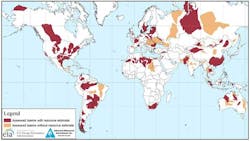America's shale gas boom is squeezing European chemical manufacturers, forcing them to shift production away from low-margin petrochemicals toward higher-margin specialty products.
In an article published yesterday, the Financial Times reports:
"European petrochemical makers risk being squeezed between low-cost producers in the Middle East and a resurgent chemicals industry in the U.S., where feedstock and energy prices have plummeted following shale gas discoveries.
"After a decade of almost zero capacity expansion in U.S. petrochemicals, shale gas has prompted the likes of Dow Chemical [IW 500/25], LyondellBasell [IW 1000/99], Chevron Phillips and ExxonMobil Chemical to invest billions of dollars in ethane cracker capacity on the U.S. Gulf Coast.
"Fresh U.S. supplies of petrochemicals – primarily ethylene derivatives such as polyethylene and PVC – will hit global export markets in coming years. Meanwhile, Middle Eastern chemical companies that have long had a big feedstock and energy cost advantage over Europe may struggle to export to a more competitive U.S. and seek European customers instead."
Russia Makes Shale Oil Moves
Meanwhile, the Christian Science Monitor reports that Russia is eyeing a shale oil boom of its own.
A joint venture formed by energy giants Rosneft (IW 1000/38) of Russia and Statoil (IW 1000/26) of Norway has begun working to unlock the oil potential of the Samara region near the Kazakhstan border in southwestern Russia.
Russia holds the largest deposits of technically recoverable shale oil at about 75 billion barrels, according to the U.S. Energy Information Administration.
Here are the EIA's estimates of the top 10 countries with technically recoverable shale oil resources:
|
Rank |
Country |
Billions of Barrels |
|
1 |
Russia |
75 |
|
2 |
U.S. |
58 |
|
3 |
China |
32 |
|
4 |
Argentina |
27 |
|
5 |
Libya |
26 |
|
6 |
Australia |
18 |
|
7 |
Venezuela |
13 |
|
8 |
Mexico |
13 |
|
9 |
Pakistan |
9 |
|
10 |
Canada |
9 |
About the Author
Pete Fehrenbach
Pete Fehrenbach, Associate Editor
Focus: Workforce | Chemical & Energy Industries | IW Manufacturing Hall of Fame
Follow Pete on Twitter: @PFehrenbachIW
Associate editor Pete Fehrenbach covers strategies and best practices in manufacturing workforce, delivering information about compensation strategies, education and training, employee engagement and retention, and teamwork. He writes a blog about workforce issue called Team Play.
Pete also provides news and analysis about successful companies in the chemical and energy industries, including oil and gas, renewable and alternative.
In addition, Pete coordinates the IndustryWeek Manufacturing Hall of Fame, IW’s annual tribute to the most influential executives and thought leaders in U.S. manufacturing history.
